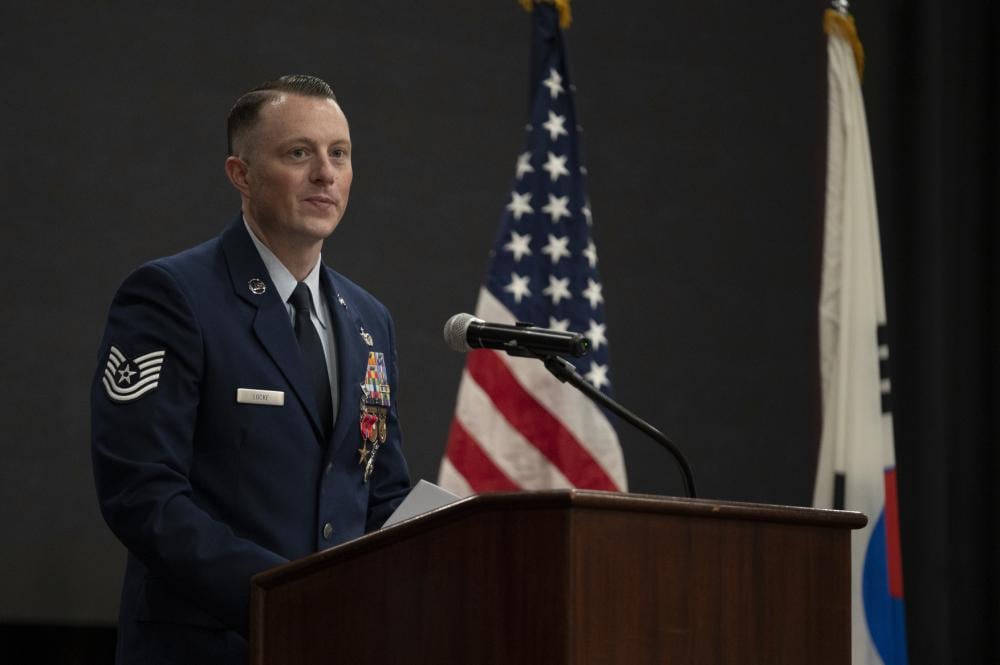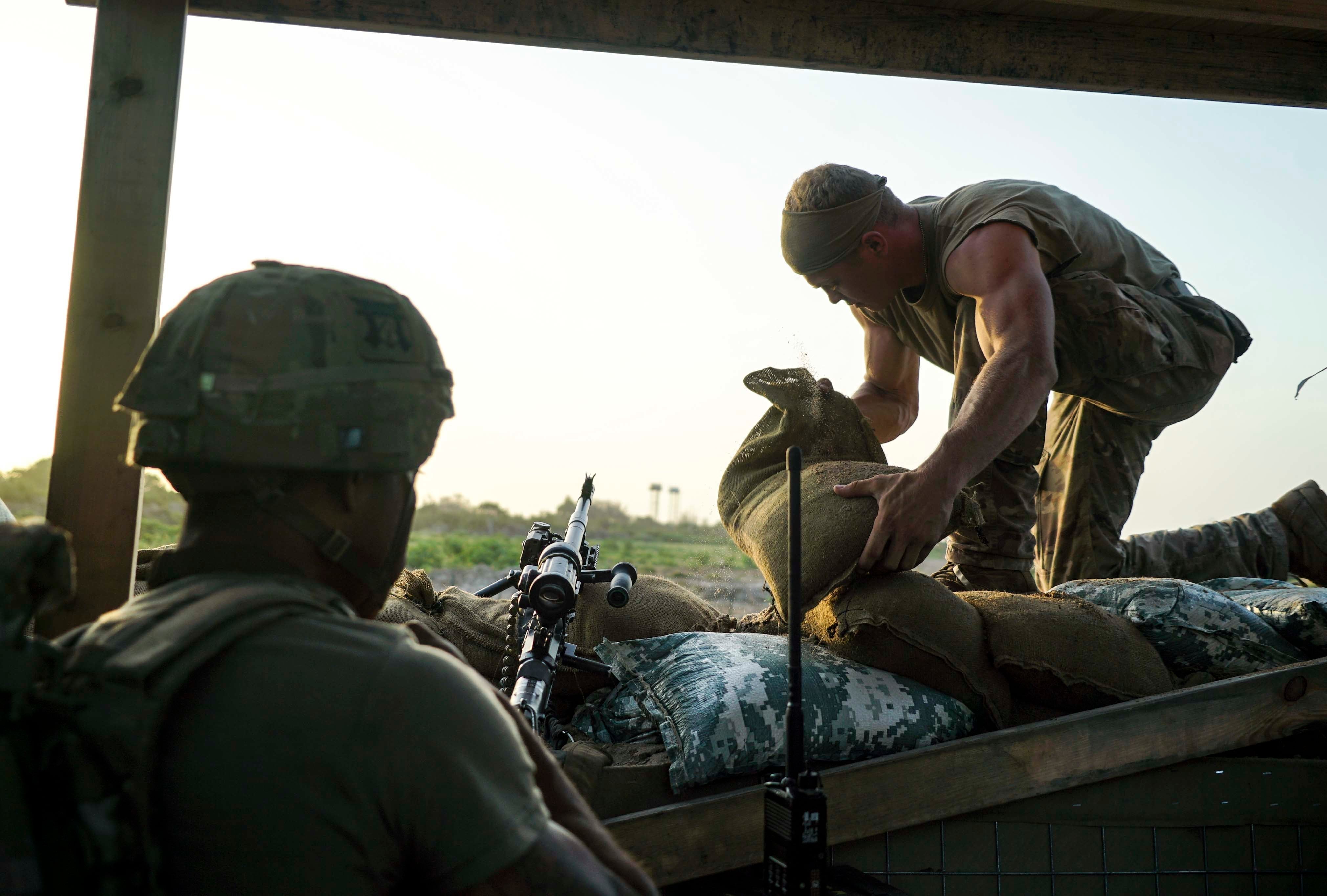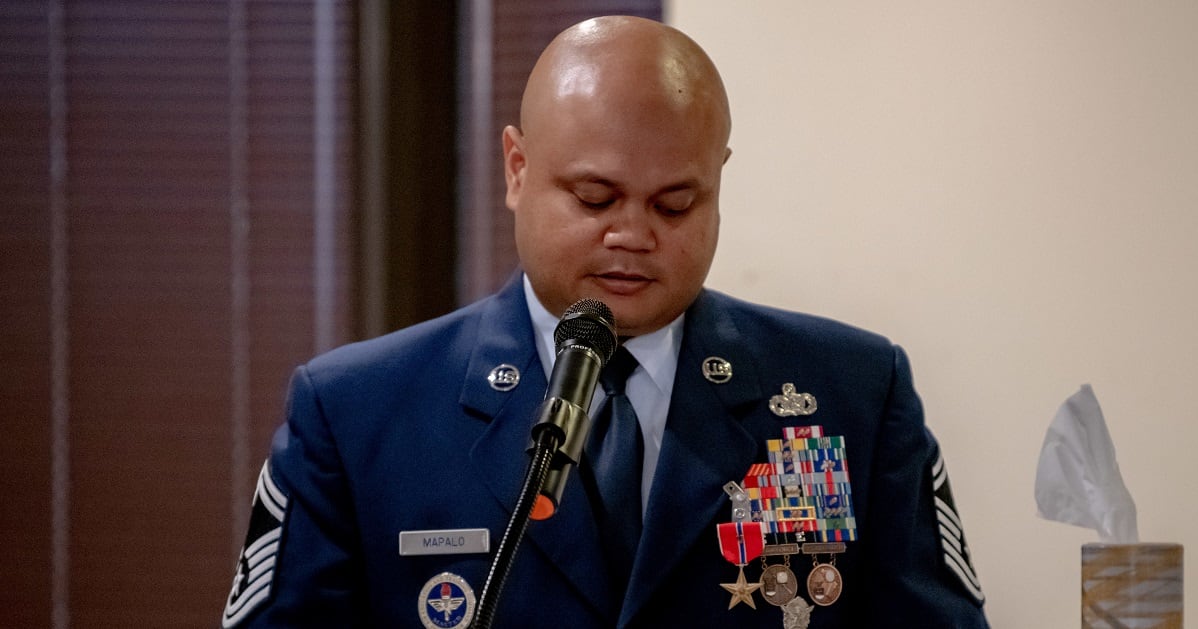Three enlisted airmen recently received Bronze Star medals for valor, the fourth-highest U.S. military decoration, for defending their fellow Americans when their installation came under fire from militants in Kenya in 2020.
Tech. Sgt. Jordan Locke accepted the Bronze Star with “V” device during a ceremony at Osan Air Base, South Korea, on Oct. 12. Master Sgt. Mathue Snow did the same at Robins Air Force Base, Georgia, on Sept. 9, and Senior Master Sgt. Jeremy Mapalo received his on Aug. 29 at RAF Lakenheath, England.
An American soldier and two civilian contractors died when about three dozen members of the al-Shabaab terror group attacked Magogoni Airfield and Camp Simba at Manda Bay, Kenya, Jan. 5, 2020. Several U.S. and Kenyan aircraft were also destroyed in the assault.
“The Magogoni airfield attack historically marks the first terrorist attack on a United States military base in Kenya,” the service said in a release.
“The Bronze Star is awarded to any member of the U.S. military for heroic or meritorious achievement or service, not involving participation in aerial flight, in connection with military operations against an armed enemy,” the Air Force said.

A subsequent Pentagon investigation found that inadequate security overall allowed the fighters to wreak havoc on the seaside base.
U.S. troops have partnered with African militaries for years to keep al-Shabaab and other violent extremist organizations at bay. The Manda Bay complex is one hub for foreign military training as well as a launching pad for counterterrorism missions across the continent.
At the time of the attack, Locke was a security forces airman with the 475th Expeditionary Air Base Squadron. Mapalo was the squadron’s operations superintendent.
Locke is now the 51st Security Forces Squadron’s flight sergeant at Osan; Mapalo is 48th Security Forces Squadron operations superintendent at Lakenheath.

Snow, the squadron’s flight chief, defended Magogoni Airfield and Camp Simba against rocket-propelled grenades, mortars and small-arms fire. He now holds the same position at the 78th Security Forces Squadron at Robins.
Snow was on patrol near the edge of the airfield when small-arms fire targeted his team. The airmen retreated to safety.
When fighting broke out, “Snow rushed to the Joint Defense Operations Center, sounded the giant voice system and quickly dispatched [security forces] to their defense towers,” the Air Force said.
He called his wife, Marlene, to let her know what was happening — and to say what could have been among his last words: “‘We are under attack and I love you.’ ”
RELATED

Enemy bullets narrowly missed Locke as well as he stood watch during the five-hour firefight, according to an Air Force press release.

Snow led troops on multiple convoys between the airfield and Camp Simba, outside the base’s perimeter, where he was vulnerable to attack.
“His actions provided logistical resupply of vehicles, equipment and personnel, and enabled the removal of debris and aircraft wreckage from the runway,” the Air Force said of Snow.
Snow’s efforts helped the airfield return to operations within two hours of the attack. That allowed casualties to evacuate and reinforcements to arrive.
Mapalo and his team also partnered with U.S. Special Operations Command and the Kenyan Navy on convoys outside the wire.
“While active enemy fire impacted on and around his position, he held overwatch security, allowing the joint operators to assault remaining enemies,” according to an Air Force press release.
Locke acknowledged the toll that fighting through the ordeal took on their group.
“One of the hardest parts was the aftermath, because everyone’s so mentally and physically exhausted,” he said in a release. “There’s a huge difference between saying, ‘Are you OK?’ and actually sitting down and having that conversation with them to make sure that they’re OK and to see if there’s anything that I can do on my end to help them.”
Security forces protected more than 350 Americans and $680 million in military assets, the Air Force said.
“The exemplary leadership, personal endeavor and devotion to duty displayed by Sgt. Snow in this responsible position reflect great credit upon himself and the United States Air Force,” Master Sgt. Levi Hupp, 78th SFS noncommissioned officer in charge of operations, said at the medal ceremony last month.
At his award ceremony, Mapalo reflected on his experience in Africa.
“We maintain constant vigilance with weapons pointed at the enemies and assets behind us,” He said. “We have been attacked because we are Americans, and we have been thanked because we are Americans. I challenge each and every one of you to learn from these battles and find your faith on what motivates you to be successful in life.”
Rachel Cohen is the editor of Air Force Times. She joined the publication as its senior reporter in March 2021. Her work has appeared in the Washington Post, the Frederick News-Post (Md.), Air and Space Forces Magazine, Inside Defense, Inside Health Policy and elsewhere.




